Henslin James M. Sociology: A Down to Earth Approach
Подождите немного. Документ загружается.

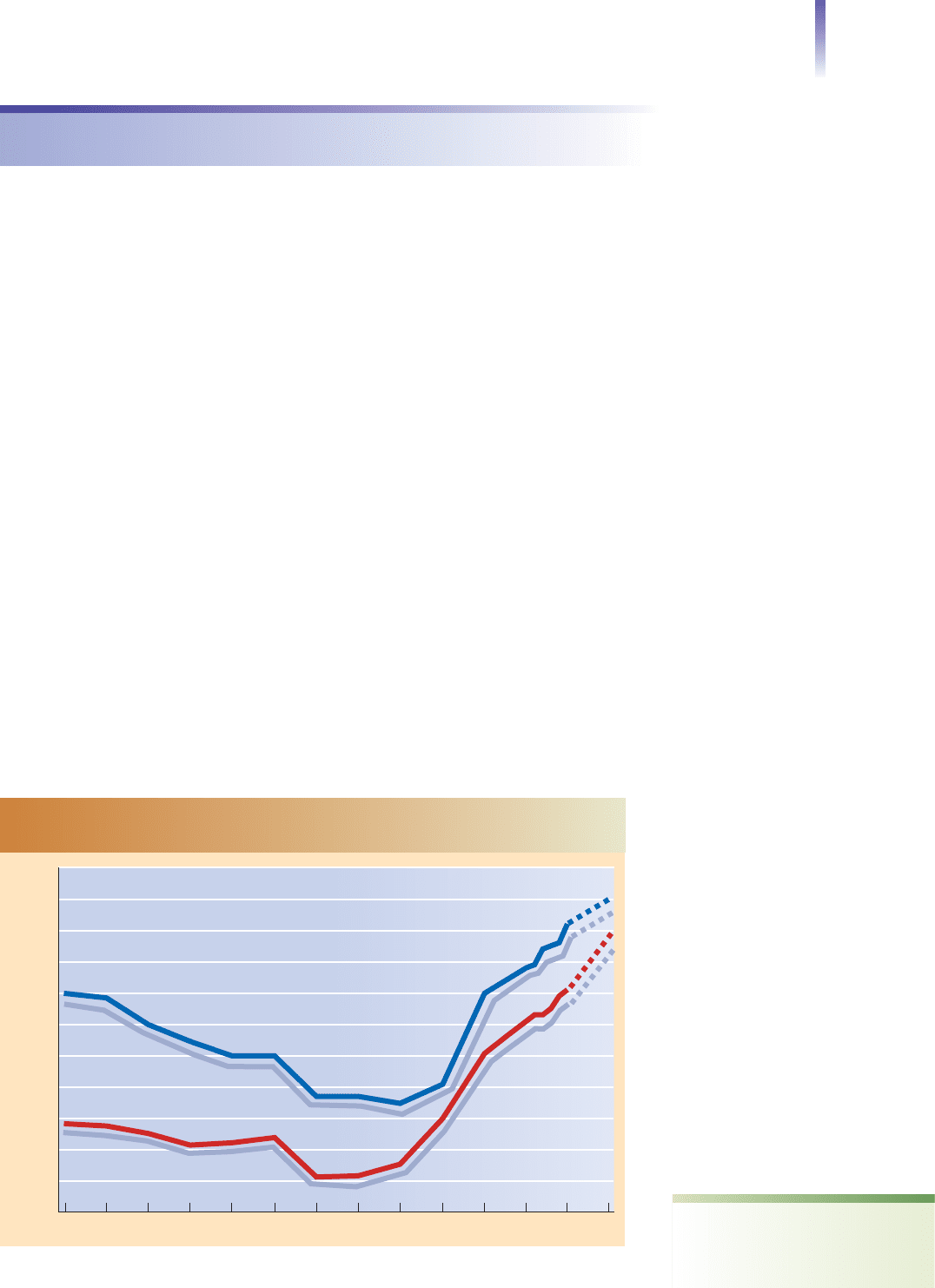
Trends in U.S. Families
As is apparent from this discussion, marriage and family life in the United States is un-
dergoing a fundamental shift. Let’s examine other indicators of this change.
Postponing Marriage and Childbirth
Figure 16.9 below illustrates one of the most significant changes in U.S. marriages. As you
can see, the average age of first-time brides and grooms declined from 1890 to about 1950.
In 1890, the typical first-time bride was 22, but by 1950, she had just left her teens. For
about twenty years, there was little change. Then in 1970, the average age started to increase
sharply. Today’s average first-time bride and groom are older than at any other time in U.S. history.
Since postponing marriage is today’s norm, it may come as a surprise to many readers
to learn that most U.S. women used to be married by the time they reached age 24. To see
this remarkable change, look at Figure 16.10 on the next page. Postponing marriage has
become so common that the percentage of women of this age who are unmarried is now
more than double what it was in 1970. Another consequence of postponing marriage is
that the average age at which U.S. women have their first child is 25.2, also the highest
in U.S. history (Mathews and Hamilton 2002; Martin et al. 2007).
Why have these changes occurred? The primary reason is cohabitation. Although Ameri-
cans have postponed the age at which they first marry, they have not postponed the age at
which they first set up housekeeping with someone of the opposite sex. Let’s look at this trend.
Cohabitation
Figure 16.11 on the next page shows the increase in cohabitation, adults living together in
a sexual relationship without being married. This figure is one of the most remarkable in so-
ciology. Hardly ever do we have totals that rise this steeply and consistently. Cohabitation
is ten times more common today than it was in the 1970s. From a furtive activity, cohabi-
tation has moved into the mainstream, and today most couples who marry have cohabited
(Popenoe 2008). Cohabitation has become so common that about 40 percent of U.S. chil-
dren will spend some time in a cohabiting family (Scommegna 2002).
Trends in U.S. Families 481
Age
19
1890 1900 1910 1920 1930 1940 1950 1960 1970 1980 1990 2010
21
22
23
24
25
26
27
28
20
2000 2020
30
29
Year
Women
Men
FIGURE 16.9 When do Americans Marry? The Changing Age
at First Marriage
Source: By the author. Based on U.S. Census Bureau 2010.
cohabitation unmarried
couples living together in a
sexual relationship
Note: This is the median age at first marriage. The broken lines indicate the author’s estimate.
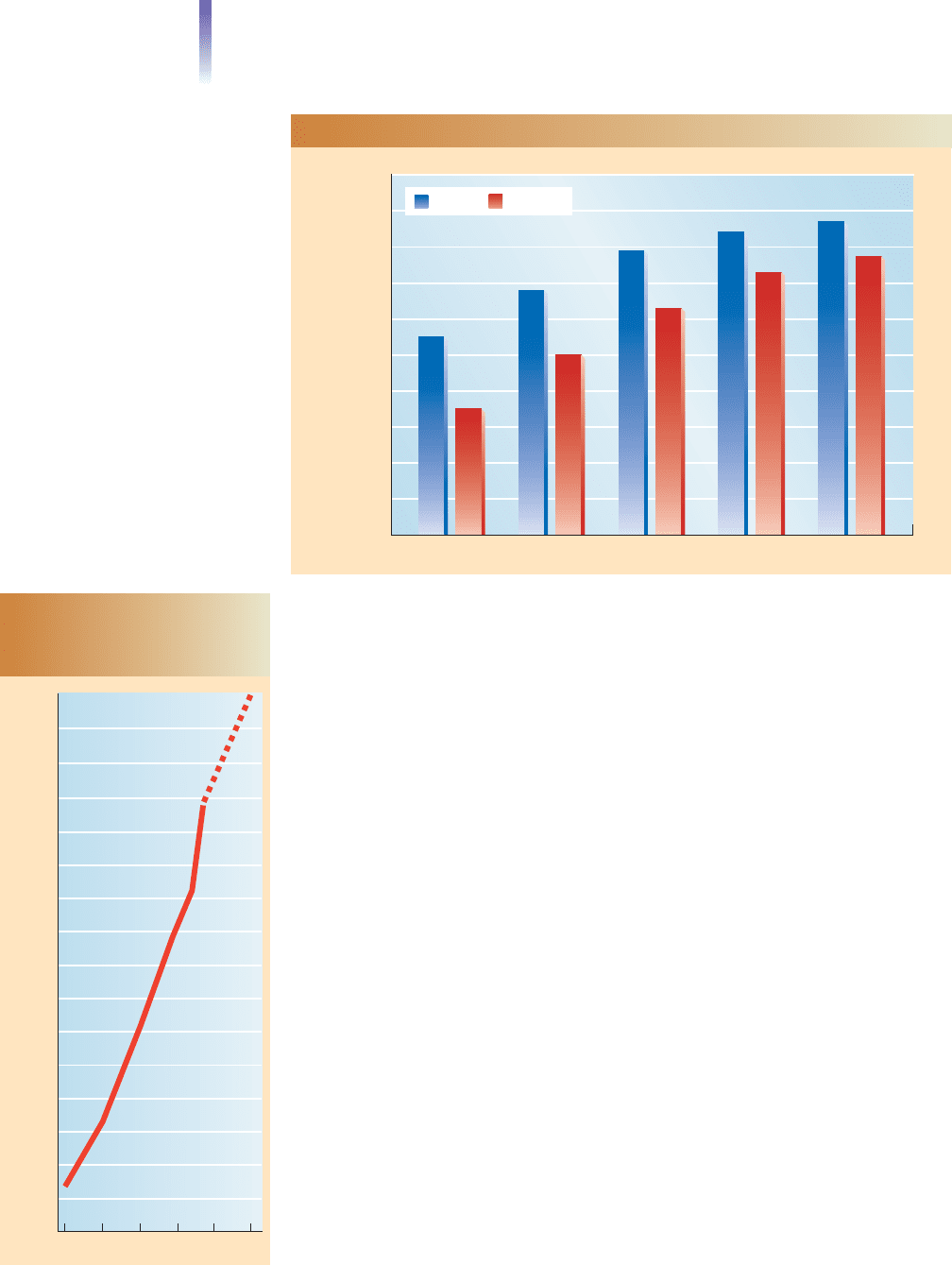
Commitment is the essential difference between cohabitation and marriage. In mar-
riage, the assumption is permanence; in cohabitation, couples agree to remain together
for “as long as it works out.” For marriage, individuals make public vows that legally
bind them as a couple; for cohabitation, they simply move in together. Marriage re-
quires a judge to authorize its termination; if a cohabiting relationship sours, the cou-
ple separates, telling friends and family that “it didn’t work out.” As you know, many
cohabiting couples marry, but do you know how this is related to what cohabitation
means to them? Let’s explore this in our Down-to-Earth Sociology box on the next page.
Are the marriages of couples who cohabited stronger than the marriages of couples
who did not live together before they married? It would seem they would be, that co-
habiting couples have had the chance to work out real-life problems prior to marriage.
To find out, sociologists have compared their divorce rates. It turns out that couples who
cohabit before marriage are more likely to divorce (Lichter and Qian 2008). Why? They
had that living-together experience, and only then did they decide to marry. The rea-
son, suggest some sociologists, is because cohabiting relationships are so easy to end
(Dush et al. 2003). Because of this, people are less picky about choosing someone to live
with (“It’s probably a temporary thing”) than choosing someone to marry (“This is re-
ally serious”). After couples cohabit, however, many experience a push toward marriage.
Some of this “push” comes from simply having common possessions, pets, and children.
Some comes from family and friends—from subtle hints to direct statements. As a re-
sult, many end up marrying a partner that they would not otherwise have chosen.
Grandparents as Parents
It is becoming more common for grandparents to rear their grandchildren. About
6 percent of U.S. children are being reared by their grandparents, twice the percent-
age of a generation ago (Lagnado 2009). The main reason for these skipped-genera-
tion families is that the parents are incapable of caring for their children. Some of the
parents have died, but the most common reasons are that the parents are ill, home-
less, addicted to drugs, or in prison. In other instances, the grandparents stepped in
when the parents neglected or abused their children.
Caring for grandchildren can bring great satisfaction. The grandparents know
that their grandchildren are in loving hands, they build strong emotional bonds with
482 Chapter 16 MARRIAGE AND FAMILY
FIGURE 16.10 Americans Ages 20–24 Who Have Never Married
Source: By the author. Based on Statistical Abstract of the United States 1993:Table 60;
2002:Table 48; 2011:Table 57.
0%
10%
20%
30%
40%
50%
60%
Percentage
100%
70%
80%
90%
1970
35%
55%
1980
50%
68%
1990
63%
79%
2000
73%
84%
2010
77.4%
87%
Women
Men
Number of Couples (in millions)
0.5
0
1970 1980 1990 2020
2010
1.0
1.5
2.0
2.5
3.0
3.5
4.0
8.0
7.5
7.0
4.5
5.0
5.5
2000
6.0
6.5
Year
Note: Broken line indicates author’s
estimate
Source: By the author. Based on U.S.
Bureau of the Census 2007b and
Statistical Abstract of the United States
1995:Table 60; 2011:Table 63.
FIGURE 16.11
Cohabitation in the
United States

them, and they are able to transmit their family values. But taking over as parents also
brings stress: the unexpected responsibilities of parenthood, the squeezed finances, the
need to continue working when they were anticipating retirement, conflict with the par-
ents of the children, and feeling trapped (Waldrop and Weber 2001; Lumpkin 2008).
This added wear and tear takes its toll, and these grandparents are more likely than oth-
ers to be depressed (Letiecq et al. 2008).
Trends in U.S. Families 483
“You Want Us to Live Together?
What Do You Mean By That?”
W
hat has led to the surge of cohabitation in
the United States? Let’s consider two funda-
mental changes in U.S. culture.
The first is changed ideas of sexual morality. It is diffi-
cult for today’s college students to grasp the sexual
morality that prevailed before the 1960s sexual revolu-
tion. Almost everyone used to consider sex before mar-
riage to be immoral. Premarital sex existed, to be sure,
but it took place furtively and often with guilt.To live to-
gether before marriage was called “shacking up,” and the
couple was said to be “living in sin.” A double standard
prevailed. It was the woman’s responsibility to say no to
sex before marriage. Consequently, she was considered
to be the especially sinful one in cohabitation.
The second cultural change is the high U.S. divorce
rate. Although the rate has declined since 1980, today’s
young adults have seen more divorce than any prior
generation. This makes marriage seem fragile, as if it isn’t
going to last regardless of how much you try to make it
work. This is scary. Cohabitation reduces the threat by
offering a relationship of intimacy in which divorce is
impossible. You can break up, but you can’t get divorced.
From the outside, all cohabitation may look the same,
but not to the people who are living together. As you can
see from Table 16.2, for about 10 percent of couples,
cohabitation is a substitute for marriage. These couples
consider themselves married but for some reason don’t
want a marriage certificate. Some object to marriage on
philosophical grounds (“What difference does a piece of
paper make?”); others do not yet have a legal divorce
from a spouse. Almost half of cohabitants (46 percent)
view cohabitation as a step on the path to marriage. For
them, cohabitation is more than “going steady” but less
than engagement. Another 15 percent of couples are
simply “giving it a try.” They want to see what marriage
to one another might be like. For the least committed,
about 29 percent, cohabitation is a form of dating. It pro-
vides a dependable source of sex and emotional support.
If you look at these couples a half dozen years after
they began to live together, you can see how important
these different levels of commitment are. As you can
see from Table 16.2, couples who view cohabitation as a
substitute for marriage are the least likely to marry and
the most likely to continue to cohabit. For couples who
see cohabitation as a step toward marriage, the out-
come is just the opposite:They are the most likely to
marry and the least likely to still be cohabiting. Couples
who are the most likely to break up are those who
“tried” cohabitation and those for whom cohabitation
was a form of dating.
For Your Consideration
Can you explain why the meaning of cohabitation makes
a difference in whether couples marry? Can you classify
cohabiting couples you know into these four types? Do
you think there are other types? If so, what?
Down-to-Earth Sociology
Substitute for Marriage 10% 35% 65% 37% 63%
Step toward Marriage 46% 31% 69% 73% 27%
Trial Marriage 15% 51% 49% 66% 34%
Coresidential Dating 29% 46% 54% 61% 39%
TABLE 16.2 What Cohabitation Means: Does It Make a Difference?
After 5 to 7 years
Of Those Still Together
Source: Recomputed from Bianchi and Casper 2000.
What Cohabitation
Means
Percent of
Couples
Split
Up
Married Cohabitating
Still
Together
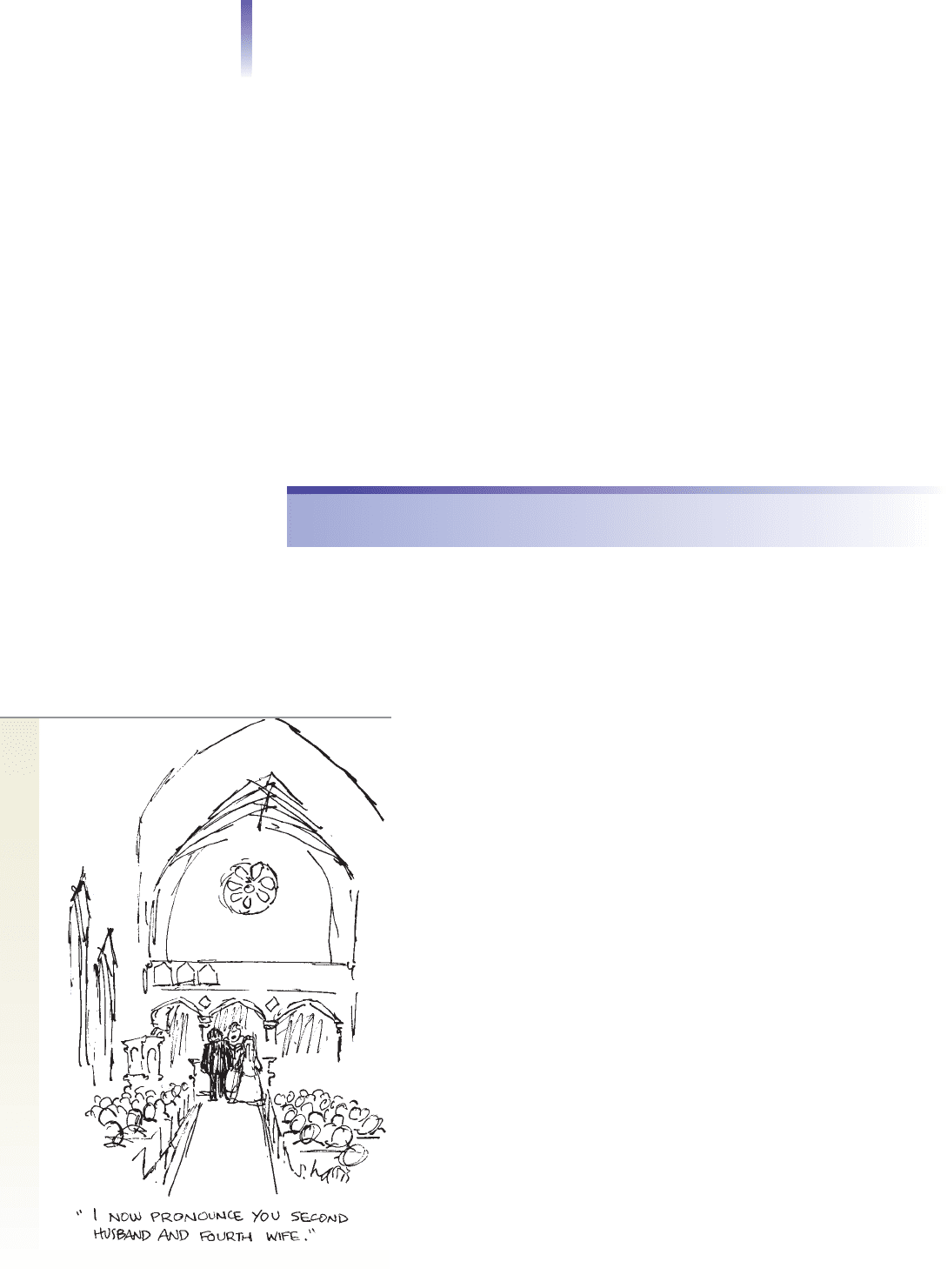
The “Sandwich Generation” and Elder Care
The “sandwich generation” refers to people who find themselves sandwiched between and
responsible for two other generations, their children and their own aging parents. Typi-
cally between the ages of 40 and 55, these people find themselves pulled in two different
directions. Many feel overwhelmed as these competing responsibilities collide. Some are
plagued with guilt and anger because they can be in only one place at a time and have lit-
tle time to pursue personal interests.
Concerns about elder care have gained the attention of the corporate world, and half
of the 1,000 largest U.S. companies offer elder care assistance to their employees (Hewitt
Associates 2004). This assistance includes seminars, referral services, and flexible work
schedules to help employees meet their responsibilities without missing so much work.
Why are companies responding more positively to the issue of elder care than to child care?
Most CEOs are older men whose wives stayed home to take care of their children, so they
don’t understand the stresses of balancing work and child care. In contrast, nearly all have
aging parents, and many have faced the turmoil of trying to cope with both their parents’
needs and those of work and their own family.
With people living longer, this issue is likely to become increasingly urgent.
Divorce and Remarriage
The topic of family life would not be complete without considering divorce. Let’s first try
to determine how much divorce there really is.
Ways of Measuring Divorce
You probably have heard that the U.S. divorce rate is 50 percent, a figure that is popular
with reporters. The statistic is true in the sense that each year almost half as many di-
vorces are granted as there are marriages performed. The totals are 2.2
million marriages and about 1.1 million divorces (Statistical Abstract
2011:Table 129).
What is wrong, then, with saying that the divorce rate is about 50
percent? Think about it for a moment. Why should we compare the
number of divorces and marriages that take place during the same year?
The couples who divorced do not—with rare exceptions—come from the
group that married that year. The one number has nothing to do with
the other, so these statistics in no way establish the divorce rate.
What figures should we compare, then? Couples who divorce come
from the entire group of married people in the country. Since the United
States has 60,000,000 married couples, and a little over 1 million of
them get divorced in a year, the divorce rate for any given year is less
than 2 percent. A couple’s chances of still being married at the end of a
year are over 98 percent—not bad odds—and certainly much better odds
than the mass media would have us believe. As the Social Map on the
next page shows, the “odds”—if we want to call them that—depend on
where you live.
Over time, of course, each year’s small percentage adds up. A third way
of measuring divorce, then, is to ask, “Of all U.S. adults, what percent-
age are divorced?” Figure 16.13 on the next page answers this question.
You can see how divorce has increased over the years and how race–
ethnicity makes a difference for the likelihood that couples will divorce. If
you look closely, you can also see that the rate of divorce has slowed down.
Figure 16.13 shows us the percentage of Americans who are currently
divorced, but we get yet another answer if we ask the question, “What
percentage of Americans have ever been divorced?” This percentage in-
creases with each age group, peaking when people reach their 50s. Forty
percent of women in their 50s have been divorced at some point in their
484 Chapter 16 MARRIAGE AND FAMILY
This fanciful depiction of marital trends may not be
too far off the mark.
Reprinted with special permission of King Features Syndicate
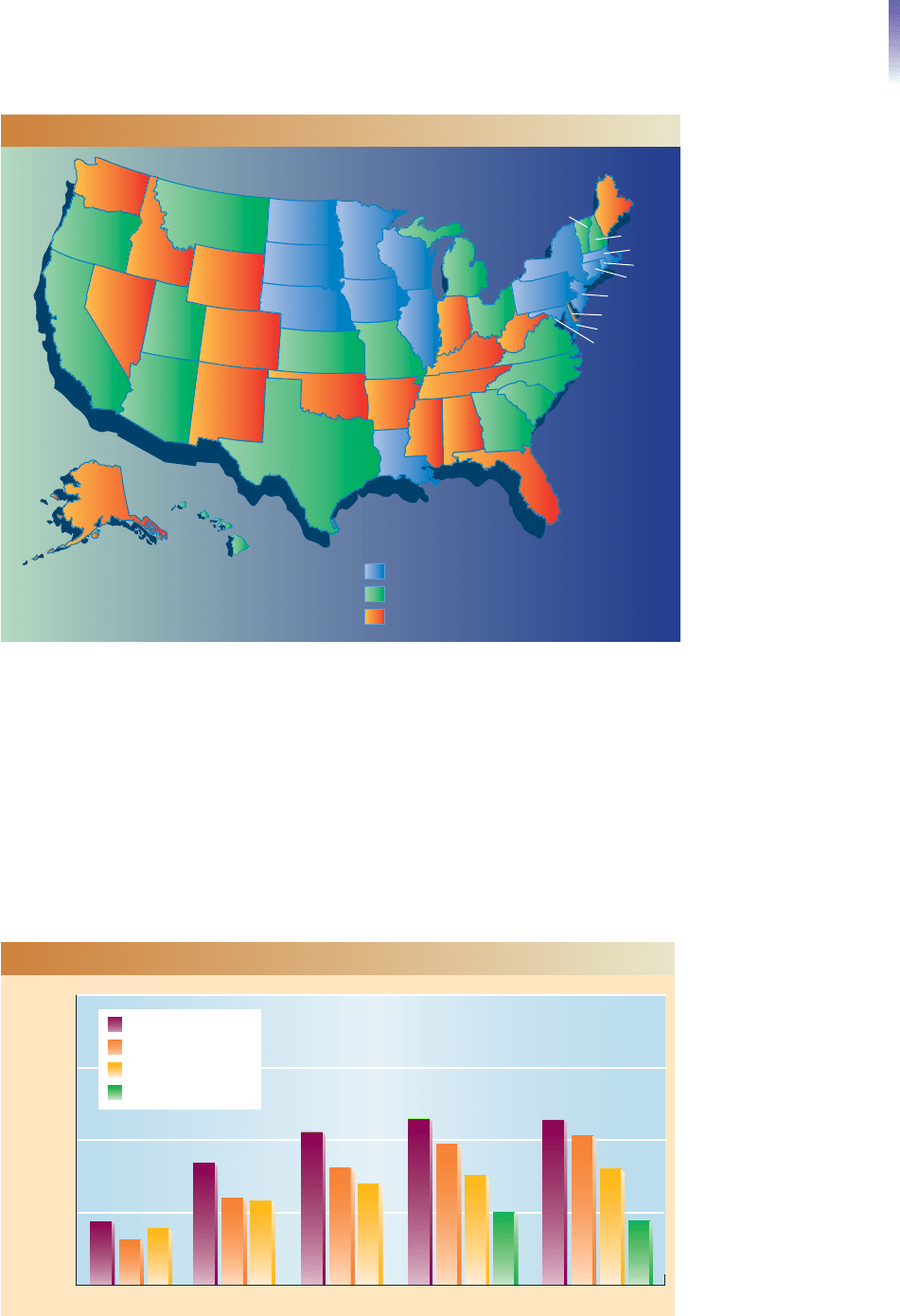
lives; for men, the total is 43 percent (“Marital History . . .” 2004). Looked at in this way,
a divorce rate of 50 percent, then, is fairly accurate.
What most of us want to know is what our chances of divorce are. It is one thing to
know that a certain percentage of Americans are divorced, but have sociologists found
out anything that will tell me about my chances of divorce? This is the topic of the Down-
to-Earth Sociology box on the next page.
Divorce and Remarriage 485
FIGURE 16.12 The “Where” of U.S. Divorce
Source: By the author. Based on Statistical Abstract of the United States 1995:Table 149;
2002:Table 111; 2011:Table 126.
Lower than average: 2.2 to 3.1
Annual divorces per 1,000 people
Average: 3.3 to 4.1
Higher than average: 4.3 to 6.5
AK
SC
NC
VA
WA
OR
CA
NV
ID
MT
WY
AZ
NM
CO
ND
SD
NE
KS
OK
TX
MN
IA
MO
AR
LA
WI
IL
KY
TN
MS
AL
GA
FL
IN
MI
WV
PA
NY
ME
NH
MA
RI
CT
NJ
DE
MD
DC
HI
VT
UT
OH
FIGURE 16.13 What Percentage of Americans Are Divorced?
Source: By the author. Based on Statistical Abstract of the United States 1995:Table 58; 2011:Table 56.
0%
5%
10%
15%
Percentage
20%
1970
4.4
3.1
3.9
1980
8.4
6.0 5.8
1990
10.6
8.1
7.0
2000
11.5
9.8
7.6
5.0
2010
11.4
10.3
8.0
4.4
African Americans
Whites
Latinos
Asian Americans
Note: Data for California, Georgia, Hawaii, Indiana, and Louisiana, based on the earlier editions
in the source, have been decreased by the average decrease in U.S. divorce.
Note: This figure shows the percentage who are divorced and have not remarried, not the
percentage who have ever divorced. Only these racial–ethnic groups are listed in the source.The
source only recently added data on Asian Americans.
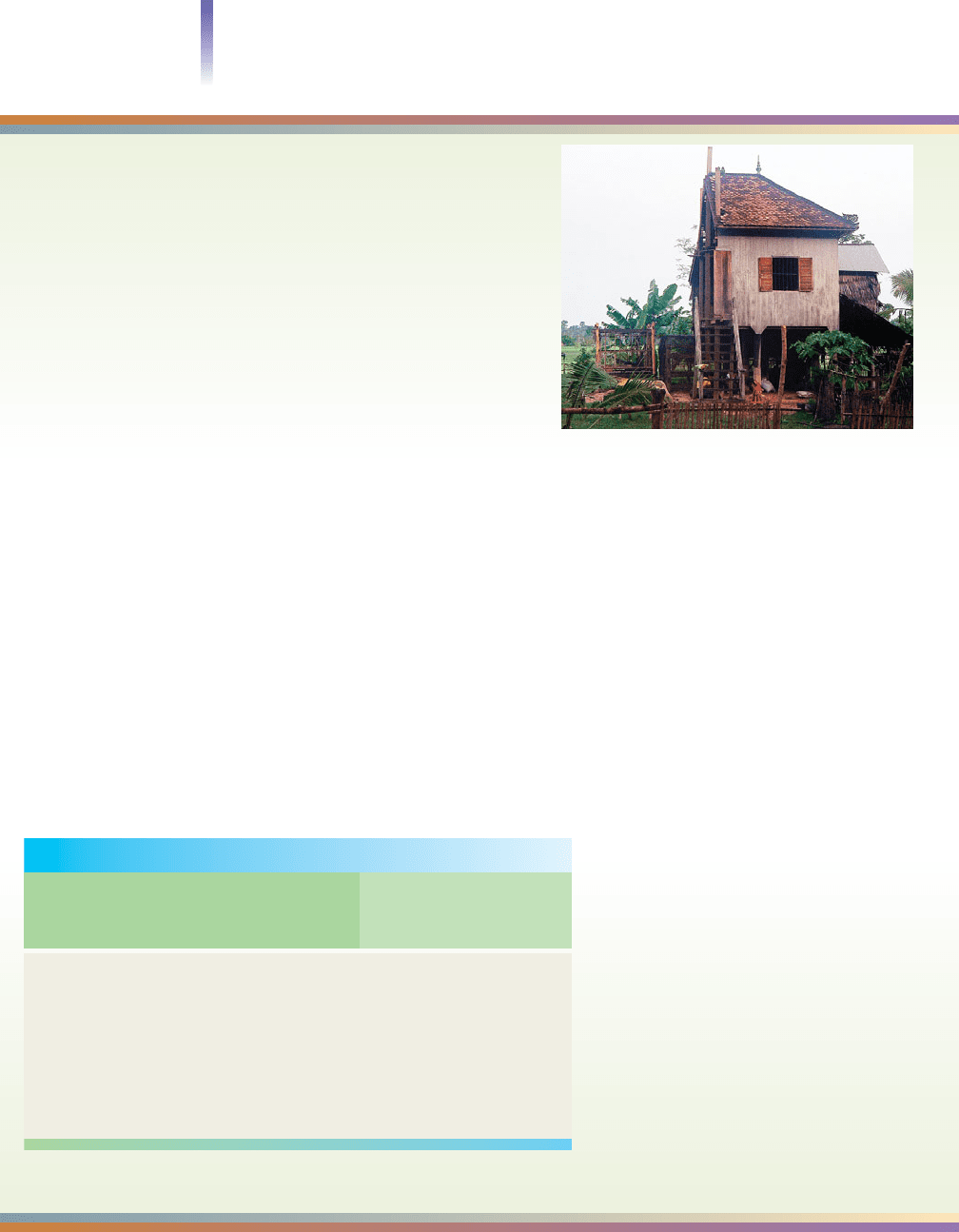
Children of Divorce
Each year, more than 1 million U.S. children learn that their parents are divorcing. Num-
bers like this are cold. They don’t tell us what divorce feels like, what the children experience.
In the Down-to-Earth Sociology box on the next page, we try to catch a glimpse of this.
Children whose parents divorce are more likely than children reared by both parents to ex-
perience emotional problems, both during childhood and after they grow up (Amato and
486 Chapter 16 MARRIAGE AND FAMILY
“What Are Your Chances of
Getting Divorced?”
I
t is probably true that over a lifetime about half of all
marriages fail (Whitehead and Popenoe 2004). If you
have that 50 percent figure dancing in your head while
you are getting married, you might as well make sure that
you have an escape door open even while you’re saying “I
do.”
Not every group carries the same risk of divorce. For
some, the risk is much higher; for others, much lower.
Let’s look at some factors that reduce people’s risk. As
Table 16.3 shows, sociologists have worked out percent-
ages that you might find useful. As you can see, people
who go to college, participate in a religion, wait to get
married before having children, and earn higher incomes
have a much better chance that their marriage will last.
You can also see that having parents who did not divorce
is significant. If you reverse these factors, you will see
how the likelihood of divorce increases for people who
have a baby before they marry, who marry in their teens,
and so on. It is important to note, however, that these
factors reduce the risk of divorce for groups of people,
not for any particular individual.
Three other factors increase the risk for divorce, but
for these, sociologists have not computed percentages:
The first will probably strike you as strange—if a cou-
ple’s firstborn child is a girl (Ananat and Michaels 2007;
Dahl and Moretti 2008). Apparently, men prefer sons, and
if the firstborn is a boy, the father is more likely to stick
around. The second factor is more obvious: The more
co-workers you have who are of the opposite sex, the
more likely you are to get divorced (McKinnish 2007).
(I’m sure you can figure out why.) No one knows the
reason for the third factor: working with people who are
recently divorced (Aberg 2003). It could be that divorced
people are more likely to “hit” on their fellow workers—
and human nature being what it is . . .
For Your Consideration
Why do you think that people who go to
college have a lower risk of divorce? How
would you explain the other factors shown
in Table 16.3? What other factors discussed
in this chapter indicate a greater or lesser
risk of divorce?
Why can’t you figure your own chances
of divorce by starting with some percentage
(say 30 percent likelihood of divorce for the
first 10 years of marriage) and then reduc-
ing it according to this table (subtracting
13 percent of the 30 percent for going to
college, and so on)? To better understand
this, you might want to read the section on
the misuse of statistics on page 493.
Down-to-Earth Sociology
How Much Does This
Factors that Reduce People’s Decrease the Risk of
People’s Chances of Divorce Divorce?
Some college (vs. high-school dropout) ⫺13%
Affiliated with a religion (vs. none) ⫺14%
Parents not divorced ⫺14%
Age 25 or over at marriage (vs. under 18) ⫺24%
Having a baby 7 months or longer after ⫺24%
marriage (vs. before marriage)
Annual income over $25,000 (vs. under $25,000) ⫺30%
TABLE 16.3 What Reduces the Risk of Divorce?
Note: These percentages apply to the first ten years of marriage.
Source: Whitehead and Popenoe 2004.
Divorces are often messy. To settle the question of who
gets the house, a couple in Cambodia sawed their house
in half.
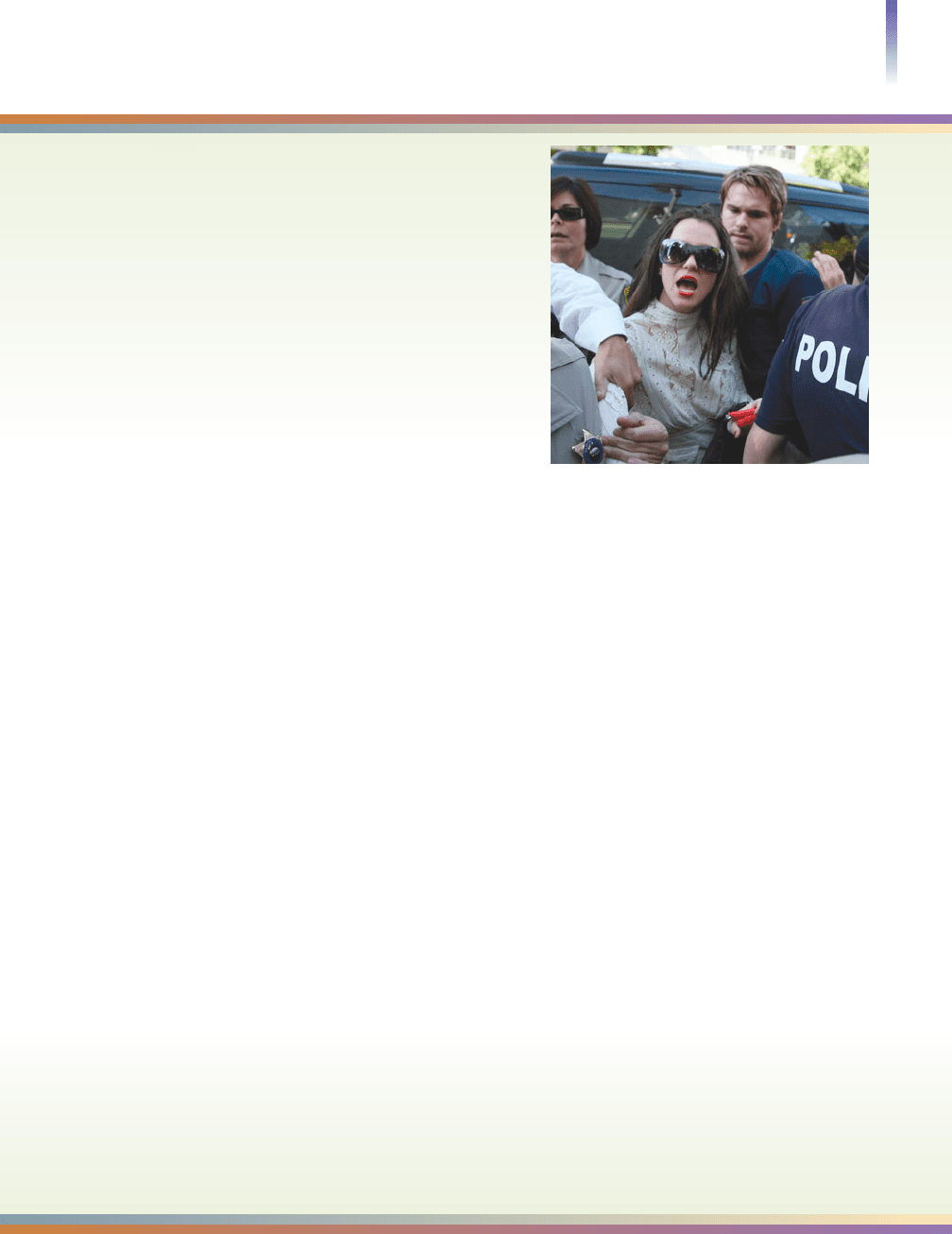
Sobolewski 2001; Weitoft et al. 2003). They are also more likely to become juvenile delin-
quents (Wallerstein et al. 2001) and less likely to complete high school, to attend college, and
to graduate from college (McLanahan and Schwartz 2002). Finally, the children of divorce are
themselves more likely to divorce (Wolfinger 2003), perpetuating a marriage–divorce cycle.
Is the greater maladjustment of the children of divorce a serious problem? This question
initiated a lively debate between two researchers, both psychologists. Judith Wallerstein
Divorce and Remarriage 487
Caught Between Two Worlds:
The Children of Divorce
T
he statistics can tell you how many couples di-
vorce, how many children these couples have, and
other interesting information. But the numbers
can’t tell what divorce is like—how children feel their
world falling apart when they learn their parents are
going to get a divorce. Or how torn apart they feel
when they are shuffled from one house to another.
Elizabeth Marquardt, a child of divorce herself, did a
national study of children of divorce. In her book,
Between Two Worlds (2005), she weaves her own experi-
ences with those of the people she interviewed, taking
us into the thought world of children who are being
pulled apart by their parents.
It’s the many little things that the statistics don’t
touch. The children feel like they are growing up in two
families, not one. This creates painful complications that
make the children feel like insiders and outsiders in their
parents’ worlds. They are outsiders when they look or
act like one of the parents. This used to be a mark of an
insider, a part of the family to which the child and the
two parents belonged. But now it reminds one parent
of the former spouse, someone they want to forget. And
those children who end up with different last names
than one of their parents—what a dramatic symbol of
outsider that is. And when children learn something about
one parent that they can’t tell the other parent—which
happens often—how uncomfortable they feel at being
unable to share this information. Outsider–insider again.
What information do you share, anyway—or what
do you not dare to share—as you travel from one world
to the other? What do you say when dad asks if mom
has a boyfriend? Is this supposed to be a secret? Will
dad get mad if you tell him? Will he feel hurt? You don’t
want him to get angry or to feel hurt.Yet you don’t
want to keep secrets. And will mom get mad if you tell
dad? It’s all so complicated for a kid.
Marquardt says that as a child of divorce she tried to
keep her two worlds apart, but they sometimes collided.
At her mom’s house, she could say that things were
“screwed up.” But if she used “screwed up” at her dad’s
house, he would correct her, saying,“Messed up.” He meant
the best for her, teaching her better language, but this left
her feeling silly and ashamed.Things like this, little to most
people, are significant to kids who feel pinched between
their parents’ differing values, beliefs, and life styles.
To shuttle between two homes is to enter and leave
different worlds—feeling things in common with each,
but also sensing distances from each. And then come the
strange relationships—their parents’ girlfriends or
boyfriends. Eventually come new blended families, which
may not blend so easily, those that bring the new step-
mom or stepdad, and perhaps their children. And then
there are the new break-ups, with a recurring cycle of
supposedly permanent relationships.What a complicated
world for a child to traverse.
Marquardt pinpoints the dilemma for the child of
divorce when she says, Being with one parent always
means not being with the other.
For Your Consideration
If you are a child of divorce, did you have two worlds of
experience? Were your experiences like those men-
tioned here? If you lived with both parents, how do you
think your life has been different because your parents
didn’t divorce?
Down-to-Earth Sociology
The custody and support of children are often a
major source of contention in divorces. Shown here
is Britney Spears, whose battle for the custody of
her children and her court-ordered support of her
former husband, Kevin Federline, made news
around the world.
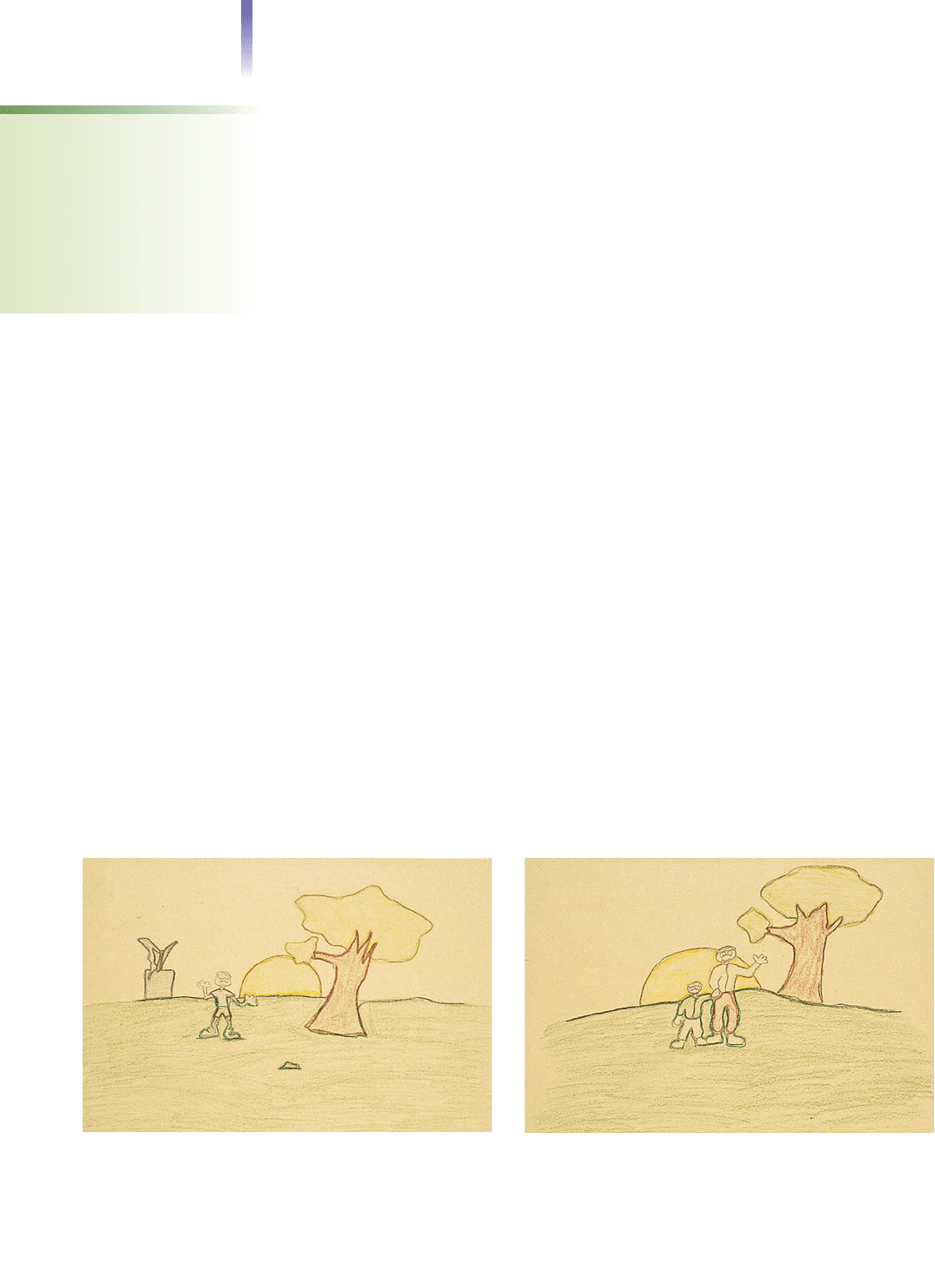
claims that divorce scars children, making them depressed and leaving them with insecu-
rities that follow them into adulthood (Wallerstein et al. 2001). Mavis Hetherington
replies that 75 to 80 percent of children of divorce function as well as children who are
reared by both of their parents (Hetherington and Kelly 2003).
Without meaning to weigh in on either side of this debate, it doesn’t seem to be a sim-
ple case of the glass being half empty or half full. If 75 to 80 percent of children of divorce
don’t suffer long-term harm, this leaves one-fourth to one-fifth who do. Any way you
look at it, one-fourth or one-fifth of a million children each year is a lot of kids who are
having a lot of problems.
What helps children adjust to divorce? Children of divorce who feel close to both par-
ents make the best adjustment, and those who don’t feel close to either parent make the
worst adjustment (Richardson and McCabe 2001). Other studies show that children ad-
just well if they experience little conflict, feel loved, live with a parent who is making a
good adjustment, and have consistent routines. It also helps if their family has adequate
money to meet its needs. Children also adjust better if a second adult can be counted on
for support (Hayashi and Strickland 1998). Urie Bronfenbrenner (1992) says this person
is like the third leg of a stool, giving stability to the smaller family unit. Any adult can be
the third leg, he says—a relative, friend, or even a former mother-in-law—but the most
powerful stabilizing third leg is the father, the ex-husband.
As mentioned, when the children of divorce grow up and marry, they are more likely to
divorce than are adults who grew up in intact families. Have researchers found any factors
that increase the chances that the children of divorce will have successful marriages? Actu-
ally, they have. They are more likely to have a lasting marriage if they marry someone whose
parents did not divorce. These marriages have more trust and less conflict. If both husband
and wife come from broken families, however, it is not good news. Those marriages tend to
have less trust and more conflict, leading to a higher chance of divorce (Wolfinger 2003).
Grandchildren of Divorce
Paul Amato and Jacob Cheadle (2005), the first sociologists to study the grandchildren
of people who had divorced, found that the effects of divorce continue across generations.
Using a national sample, they compared grandchildren—those whose grandparents had
divorced with those whose grandparents had not divorced. Their findings are astounding.
The grandchildren of divorce have weaker ties to their parents, don’t go as far in school,
488 Chapter 16 MARRIAGE AND FAMILY
serial fatherhood a pattern
of parenting in which a father,
after a divorce, reduces contact
with his own children, serves as
a father to the children of the
woman he marries or lives
with, then ignores these chil-
dren, too, after moving in with
or marrying another woman
It is difficult to capture the anguish of the children of divorce, but when I read
these lines by the fourth-grader who drew these two pictures, my heart was touched:
Me alone in the park . . .
All alone in the park.
My Dad and Mom are divorced
that’s why I’m all alone.
This is me in the picture with my son.
We are taking a walk in the park.
I will never be like my father.
I will never divorce my wife and kid.

and don’t get along as well with their spouses. As these researchers put it, when parents
divorce, the consequences ripple through the lives of children who are not yet born.
The Absent Father and Serial Fatherhood
With divorce common and mothers usually granted custody of the children, a new
fathering pattern has emerged. In this pattern, known as serial fatherhood, a di-
vorced father maintains high contact with his children during the first year or two
after the divorce. As the man develops a relationship with another woman, he begins
to play a fathering role with the woman’s children and reduces contact with his own
children. With another breakup, this pattern may repeat. Relationships are so broken
that 31 percent of children who live apart from their fathers have contact with their
father less than once a month—and this includes phone calls. Another 30 percent
have no contact with their father (Stewart 2003). For many men, fatherhood has ap-
parently become a short-term commitment.
The Ex-Spouses
Anger, depression, and anxiety are common feelings at divorce. But so is relief.
Women are more likely than men to feel that divorce is giving them a “new chance”
in life. A few couples manage to remain friends through it all—but they are the ex-
ception. The spouse who initiates the divorce usually gets over it sooner (Kelly
1992; Wang and Amato 2000) and remarries sooner (Sweeney 2002).
Divorce does not necessarily mean the end of a couple’s relationship. Many di-
vorced couples maintain contact because of their children (Fischer et al. 2005). For
others, the “continuities,” as sociologists call them, represent lingering attachments
(Vaughan 1985; Masheter 1991; author’s file 2005). The former husband may help his
former wife paint a room or move furniture; she may invite him over for a meal or to
watch television. They might even go to dinner or to see a movie together. Some cou-
ples even continue to make love after their divorce.
We don’t yet know the financial impact of divorce. Studies used to show that divorce
lowered women’s income by a third (Seltzer 1994), but current research indicates that
the finances of the average woman with minor children are either unchanged or actu-
ally improve after divorce (Bedard and Deschenes 2005; Ananat and Michaels 2007).
There seem to be three reasons: divorced women work more hours, some move in with
their parents, and others marry or cohabit with men who do better financially than their
husbands did. We need more research to resolve this question.
Remarriage
Despite the number of people who emerge from divorce court swearing “Never again!”
many do remarry. The rate at which they remarry, however, has slowed, and today only
half of women who divorce remarry (Bramlett and Mosher 2002). Figure 16.14 shows
how significant race–ethnicity is in determining whether women remarry. Comparable
data are not available for men.
As Figure 16.15 shows, most divorced people marry other divorced people. You may
be surprised that the women who are most likely to remarry are young mothers and
those with less education (Glick and Lin 1986; Schmiege et al. 2001). Apparently
women who are more educated and more independent (no children) can afford to be
more selective. Men are more likely than women to remarry, perhaps because they have
a larger pool of potential mates.
How do remarriages work out? The divorce rate of remarried people without chil-
dren is the same as that of first marriages. Those who bring children into a new marriage,
however, are more likely to divorce again (MacDonald and DeMaris 1995). Certainly
these relationships are more complicated and stressful. A lack of clear norms to follow
may also play a role (Coleman et al. 2000). As sociologist Andrew Cherlin (1989) noted,
we lack satisfactory names for stepmothers, stepfathers, stepbrothers, stepsisters,
stepaunts, stepuncles, stepcousins, and stepgrandparents. At the very least, these are awk-
ward terms to use, but they also represent ill-defined relationships.
Divorce and Remarriage 489
African Americans
Percentage
White Americans
Latinas
60%
40%
30%
20%
10%
0
50%
58%
32%
44%
Source: By the author. Based on
Bramlett and Mosher 2002.
FIGURE 16.14 The
Probability that Divorced
Women Will Remarry
in Five Years
Note: Only women and these
groups are listed in the source.
Percentage
10%
0
20%
30%
40%
50%
60
%
54
23
11
11
First marriage of bride
and groom
Remarriage of bride
and groom
First marriage of bride,
remarriage of groom
First marriage of groom,
remarriage of bride
Source: By the author. Based on
Statistical Abstract of the United
States 2000:Table 145. Table
dropped in later editions.
FIGURE 16.15 The
Marital History of U.S.
Brides and Grooms

Two Sides of Family Life
Let’s first look at situations in which marriage and family have gone seriously wrong and
then try to answer the question of what makes marriage work.
The Dark Side of Family Life: Battering, Child Abuse, Marital
Rape, and Incest
The dark side of family life involves events that people would rather keep in the dark. We
shall look at spouse battering, child abuse, rape, and incest.
Spouse Battering. To study spouse abuse, some sociologists have studied just a few
victims in depth (Goetting 2001), while others have interviewed nationally represen-
tative samples of U.S. couples (Straus and Gelles 1988; Straus 1992). Although not all
sociologists agree (Dobash et al. 1992, 1993; Pagelow 1992), Murray Straus concludes
that husbands and wives are about equally likely to attack one another. If gender equal-
ity exists here, however, it certainly vanishes when it comes to the effects of violence—
85 percent of the injured are women (Rennison 2003). A good part of the reason, of
course, is that most husbands are bigger and stronger than their wives, putting women
at a physical disadvantage in this literal battle of the sexes. The Down-to-Earth Soci-
ology box on the next page discusses why some women remain with their abusive hus-
bands.
Violence against women is related to the sexist structure of society, which we reviewed
in Chapter 11, and to the socialization that we analyzed in Chapter 3. Because they grew
up with norms that encourage aggression and the use of violence, some men feel that it
is their right to control women. When frustrated in a relationship—or even by events
outside it—some men become violent. The basic sociological question is how to social-
ize males to handle frustration and disagreements without resorting to violence (Rieker
et al. 1997). We do not yet have this answer.
Child Abuse.
I answered an ad about a lakeside house in a middle-class neighborhood that was for sale by
owner. As the woman showed me through her immaculate house, I was surprised to see a ply-
wood box in the youngest child’s bedroom. About 3 feet high, 3 feet wide, and 6 feet long,
the box was perforated with holes and had a little door with a padlock. Curious, I asked what
it was. The woman replied matter-of-factly that her son had a behavior problem, and this was
where they locked him for “time out.” She added that other times they would tie him to a
float, attach a line to the dock, and put him in the lake.
I left as soon as I could. With thoughts of a terrorized child filling my head, I called the
state child abuse hotline.
As you can tell, what I saw upset me. Most of us are bothered by child abuse—
helpless children being victimized by their parents and other adults who are supposed
to love, protect, and nurture them. The most gruesome of these cases make the evening
news: The 4-year-old girl who was beaten and raped by her mother’s boyfriend, passed
into a coma, and three days later passed out of this life; the 6- to 10-year-old children
whose stepfather videotaped them engaging in sex acts. Unlike these cases, which made
headlines in my area, most child abuse is never brought to our attention: the children
who live in filth, who are neglected—left alone for hours or even days at a time—or
who are beaten with extension cords—cases like the little boy I learned about when I
went house hunting.
Child abuse is extensive. Each year, U.S. authorities receive about 2 million reports of
children being abused or neglected. About 900,000 of these cases are substantiated
(Statistical Abstract 2011:Table 340). The excuses that parents make are incredible. Of
those I have read, the most fantastic is what a mother said to a Manhattan judge, “I slipped
490 Chapter 16 MARRIAGE AND FAMILY
